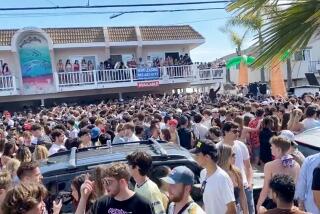Escape from Avalon
- Share via
HIGH school seniors Brenna Thompson and Paige Creigh sip from plastic cups in a coffee shop courtyard and talk about growing up in this small village on a large island.
Every few minutes, someone walks past and the girls invariably flash the quick smiles and hellos of long familiarity, then continue explaining why they love this place so much -- and why they can’t wait to leave it.
It’s the closeness behind those hellos that does it. With 3,100 year-round residents in Catalina Island’s tiny Avalon, there is hardly anyone that Thompson and Creigh haven’t known for years, an embrace that is both comforting and exasperating.
Imagine, for example, trying to settle on a prom date when you’ve been swimming in the same small dating pool since adolescence, and where half of the 58 students in Thursday’s graduating Class of 2006 started on the island together as kindergarteners. “It’s like dating your brother or sister,” Thompson says.
“Everyone knows everyone else’s business,” says Creigh, 18. “You know family trees back like three generations. You know their dogs’ names. You know their cats’ names. That can be a really neat thing, but it can also hurt you.”
For tourists from the mainland, Avalon seems an island paradise, a quaint and compact village curled into a seaside valley backing up to 42,000 acres of nature conservancy.
For a teenager growing up here, though, it can seem like a personal Elba. On a clear day, the western edge of the mainland defines the horizon and at night, Los Angeles glows like an eternal dawn. But barring a near-$50 round-trip ferry ticket and a place to stay, Los Angeles might as well be Paris.
Worse, actually. Parisians don’t come to Avalon to party every weekend and all summer. Angelenos do, creating the island’s economic lifeblood and, for the young, a constant reminder that their mainland peers live in much bigger fishbowls.
That sense of communal isolation, and an economy based on romance and margaritas, combine into an unusual stress -- the pressure to embrace adult pursuits. In a community where the movie on the town’s only screen changes once a week the hours can get pretty empty.
“I would never let my kids grow up here,” says senior Kellie Enos, 18, who moved from Yucaipa to join her divorced father in Avalon four years ago expressly to attend the island’s small K-12 school. “It’s a beautiful place to live but kids just get into way too much trouble here.... It’s like a little party town. That’s all we see, so that’s all we know.”
A magnet for visitors
The evidence lies in the heart of Avalon’s harbor front, where midweek cruise ships disgorge revelers into the harbor-side taverns. On Friday afternoons, weekenders’ luggage stacks up outside open-front bars as new arrivals put a higher priority on catching a buzz than finding their rooms.
To be sure, many visitors come here for non-boozy pursuits -- hiking and snorkeling, time at one of the nearby Christian-themed camps, or a couple of intimate nights away from the kids. But the beach-side bars seem to be irresistible magnets. Over the course of a recent Friday evening, two men left bars vomiting and a young woman needed a friend on each arm to negotiate the sidewalk. And that was before the summer tourism season kicks into high gear.
The beachfront is also a magnet for island teens, who mill around the foot of the green pier in a hive of bridled energy under the watchful eyes of sheriff’s deputies until Avalon’s curfew kicks in at 10 p.m. -- one of Avalon’s most persistent points of friction.
“Every day is the same here,” says Grant Cotter, 20, who left the island after graduation to attend Golden West College in Huntington Beach but returns most weekends. He recapped the basic social conversation: “What are you going to do?” “I don’t know. Let’s get in the golf cart and go drink somewhere.”
The partying has had deadly consequences. In 1999, 18-year-old David Ramirez Jr. and a fellow student, looking for a spot to smoke, hoisted themselves from a balcony to the roof of the Glenmore Hotel during a post-prom party. Ramirez slipped on the way back to the room, falling four stories to his death.
“Kids start drinking and experimenting with other things at a much earlier age here,” says Sean Brannock, the city of Avalon’s recreation director. “I think there’s a lot of opportunity for kids to get involved in things over here. They just have to be motivated to do so.... Hiking, kayaking, swimming, camping, things like that, are right at their fingertips. You kind of lose sight of that when you live here.”
The city’s recreational programs are aimed at pre-high schoolers, but “for the older kids, if you’re not an athlete there aren’t a whole lot of options,” he says. Community Church runs a teen center on the island “but it isn’t really a thing for everyone because not everyone wants to go into that environment.”
The closeness has its charms. For the prom last month, couples began gathering in downtown Avalon around 5 p.m. on a Saturday for the annual walk up a red carpet along the main pier, where parents and tourists became paparazzi as though the young couples were Hollywood’s cream on Oscar night.
And on Thursday, each of the 58 graduating seniors will receive some sort of scholarship or grant, even if only for a few dollars. And each will be feted in the island’s famous Casino with short slide-show biographies as they receive their diplomas, an intensely personal rite of passage compared with the quick walk and handshake that mark most mainland graduations.
“There’s something undeniably wonderful and lovely about this place” that plays out in “our offbeat little events,” Creigh says, describing an intangible closeness that exists even between people who don’t particularly care for each other. “It’s more than community, more than family,” she says.
Destination: mainland
Still, four of five seniors plan to leave the island this summer for college or the military, according to a recent informal survey by Avalon schools counselor Judy Ramming. It will be culture shock. Here, few people have cars and most get around in small electric golf carts, comically inadequate preparation for navigating freeways. And there are more students in a typical college freshman survey course than Avalon’s entire senior class.
Some have been preparing. Thompson, who will attend the University of Redlands in the fall, makes regular trips to visit her sister and older friends at mainland colleges. Creigh, headed for USC, and Enos also make regular weekend trips to stay with friends and relatives.
“It’s totally a culture shock,” Creigh says. “You’ve got to prepare yourself for it and hope you don’t freak out and come back.”
“I’m totally terrified of driving on the mainland,” Thompson says. “I was really worried to leave here and try and make it, but visiting [my sister] often really helps that.”
Bryant Lopez, 18, will be among those joining the generational exodus, moving in with an uncle in late August to attend Long Beach City College. As much as he enjoys camping with friends on the far side of the island overlooking the open Pacific, or cooking up impromptu barbecues at Avalon’s Descanso Beach, he chafes at the island’s social and physical limits. “Sometimes, because it’s so small,” Lopez says, “I just have to get out.”
Even former students such as Curtis Villano, 21, who stayed on after graduation a couple years ago and works as a custodian on the island, looks ahead to life “over town.”
“Man, we’re just saving up the money” to move, Villano says at dusk on a recent Thursday as he sits talking with four friends, waiting for the night to get interesting, which invariably includes hooking up with island friends and watching the tourists stumble around drunkenly.
There are impromptu and illicit parties on remote beaches or hidden spots in the hills, and the occasional rented bungalow or hotel room as teens try to elude the island’s curfew-enforcing deputies.
The curfew, affecting anyone younger than 18, was adopted about three years ago after city officials became concerned that teens’ beachfront behavior might drive away tourists. Youthful exuberance took on a harsher veneer as kids turned garbage cans into drums, heckled some of the passersby and, in one now-infamous incident, a teenage boy defecated on the sidewalk.
“A few youths in town were stirring it up for the rest of them,” says Mayor Bob Kennedy, who runs a diving business and was elected to the City Council after the curfew was adopted. He became mayor this spring.
One of the early applications of the law was prom night three years ago, during which Los Angeles County Sheriff’s deputies issued curfew citations to about 50 kids who posed for unchaperoned photographs at a late-night underage party spot.
One of Kennedy’s daughters was among the ticketed, which helped propel his first run for office. Kennedy opposes the curfew because he says it’s applied unevenly (underage visitors tend to get a pass) and punishes the many for the problems of the few.
But he doesn’t plan to push for change until the island teens make the case themselves. “To date,” he says, “they have not done that.”
Avoiding trouble
Lt. Pat Hunter, who runs the L.A. County Sheriff’s station on the island, sees the curfew as a means of sequestering teens from vices.
“It’s necessary because we have a town that’s a resort destination, and many people come here to partake in the restaurants and the nightlife,” says Hunter, who has three teenage sons. “We want to make sure we keep our kids out of an adult area.”
Yet the failures are obvious as the teens talk about their illicit parties. From a law-enforcement standpoint, “use of drugs and underage drinking are issues I’m particularly sensitive to,” Hunter says. “Any resort town has the same problems.”
But the remoteness of life here creates its peculiar spin.
“The biggest issue is once they graduate from high school, what are they going to do with their lives?” Hunter says, adding that on Catalina housing is tight and good jobs hard to land. “Anyone who chooses to make a life over here faces some pretty stiff competition.”
So the parents raise the children to leave, a unique process of weaning from the very village it took to raise them.
“It is a positive thing, but as a parent you don’t want to handcuff your kids,” Kennedy says of the scrutiny of life in the Avalon fishbowl. “They need to live their lives and make mistakes before we send them out into the real world to fend on their own.”
More to Read
Sign up for The Wild
We’ll help you find the best places to hike, bike and run, as well as the perfect silent spots for meditation and yoga.
You may occasionally receive promotional content from the Los Angeles Times.







